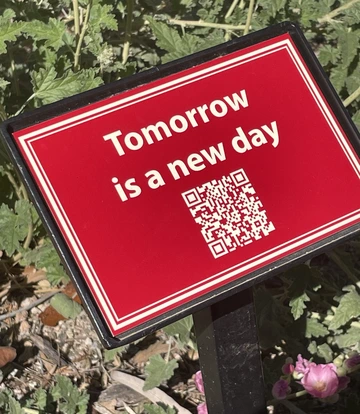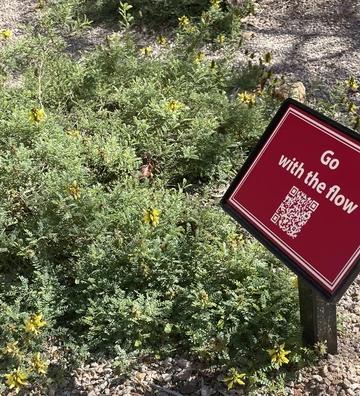Promoting Human and Environmental Resilience
Central in the development of arboretum programs is the goal of connecting people with plants. The project supports the arboretum mission as it aims to connect people with the healing benefits of nature (albeit urban nature) and to communicate lessons in plant science that embody principles of resilience. In so doing, this garden educates, and empower environmental stewardship while also nourishing the human spirit.
This garden is rooted in science.

The development of this garden stems from research at the Desert Legume Program (DELEP), where promising tree species in the legume family were assessed for their potential to thrive in our arid climate. Eight tree species proven to perform in extreme climates, were salvaged and brought to this site in 2020. (See /research/desert-legume-tree-rescue) . Thereafter, students in Environmental Science designed and installed water harvesting basins, scientists in Natural Resources installed sensors to assess water infiltration/basin performance, and Plant Sciences students selected, designed, and installed the understory plants to highlight inspiring botanical lessons. In recognition that plants, people and environmental resilience are interconnected, this garden aims to integrate all three. As visitors to the garden read messages of inspiration, and learn how plants embody principles of resilience, we hope the human spirit will be renewed and the human mind filled with wonder and curiosity. Inasmuch as this happens, this garden will educate, and empower environmental stewardship while also nourishing the human spirit.
What is Resilience?
"The power or ability of a material to return to its original form, position, etc., after being bent, compressed, or stretched; elasticity." Dictionary.com
Resilience usually results from a sustained effort to build our capacity for flexibility and adaptation in the face of challenge. Desert plants are great models of resilience. Since they have evolved over thousands of year in response to stress, that they not only withstand it but also thrive beyond it. This garden was inspired by plant characteristics that contribute to their resilience with the hope that visitors will consider the relevance of these practices in the human realm.

Use the campus map to locate the Gould-Simpson Building. The Resilience Garden is located on the south face of that building. As you walk around the garden, consider the lessons in resilience plants can teach you. Using the camera app on your mobile device, and scan the QR code on the sign to learn more about strategies plants use to boost their resilience. Alternatively, click below to visit virtually.

